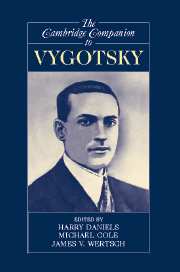Book contents
- Frontmatter
- Editors’ Introduction
- Part I: Vygotsky in Context
- Part II: Readings of Vygotsky
- Part III: Applications of Vygotsky’s Work
- 12 Pedagogy
- 13 Sociocultural Theory and Education of Children with Special Needs: From Defectology to Remedial Pedagogy
- 14 Putting Vygotsky to Work: The Change Laboratory as an Application of Double Stimulation
- References
- Index
12 - Pedagogy
from Part III: - Applications of Vygotsky’s Work
Published online by Cambridge University Press: 28 November 2007
- Frontmatter
- Editors’ Introduction
- Part I: Vygotsky in Context
- Part II: Readings of Vygotsky
- Part III: Applications of Vygotsky’s Work
- 12 Pedagogy
- 13 Sociocultural Theory and Education of Children with Special Needs: From Defectology to Remedial Pedagogy
- 14 Putting Vygotsky to Work: The Change Laboratory as an Application of Double Stimulation
- References
- Index
Summary
INTRODUCTION
In this chapter, I will discuss the pedagogic implications of some aspects of Vygotsky's writing. I will draw heavily on his own words and seek to develop two major strands in the range of possible interpretations of his work. The central tension that I wish to explore is between those accounts that emphasize the analysis of the content of instruction as against those which are more concerned with forms of pedagogic interaction and participation. Arguably, many of the differences in emphasis and priority that have arisen reflect differences in what are, ultimately, political preferences. Vygotsky was well aware of the extent to which pedagogic practice is subject to social, cultural, and political influence.
Pedagogics is never and was never politically indifferent, since, willingly or unwillingly, through its own work on the psyche, it has always adopted a particular social pattern, political line, in accordance with the dominant social class that has guided its interests. (Vygotsky, 1997b, p. 348)
Vygotsky was suggesting a process of social formation in the formation of educational ideas. He distances himself from the naturalistic or common sense pedagogic positions that pervade so much political debate, particularly when the term back to basics is invoked. For him pedagogies arise and are shaped in particular social circumstances. Ironically, the text Pedagogical Psychology from which the above quote is drawn, was considered to be so politically unacceptable to the rulers of the Soviet state that one had to have a special pass from the KGB that would admit one to the restricted reading room in the Lenin Library where the book could be read (Davydov, 1993).
- Type
- Chapter
- Information
- The Cambridge Companion to Vygotsky , pp. 307 - 331Publisher: Cambridge University PressPrint publication year: 2007
- 49
- Cited by

